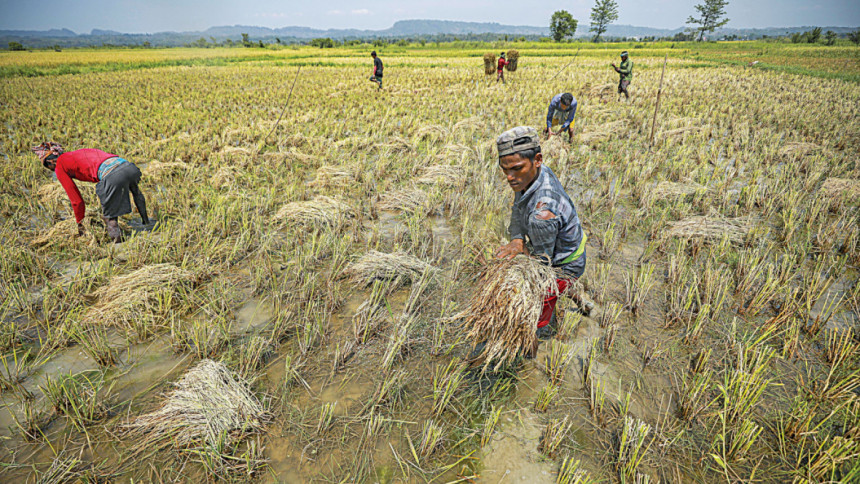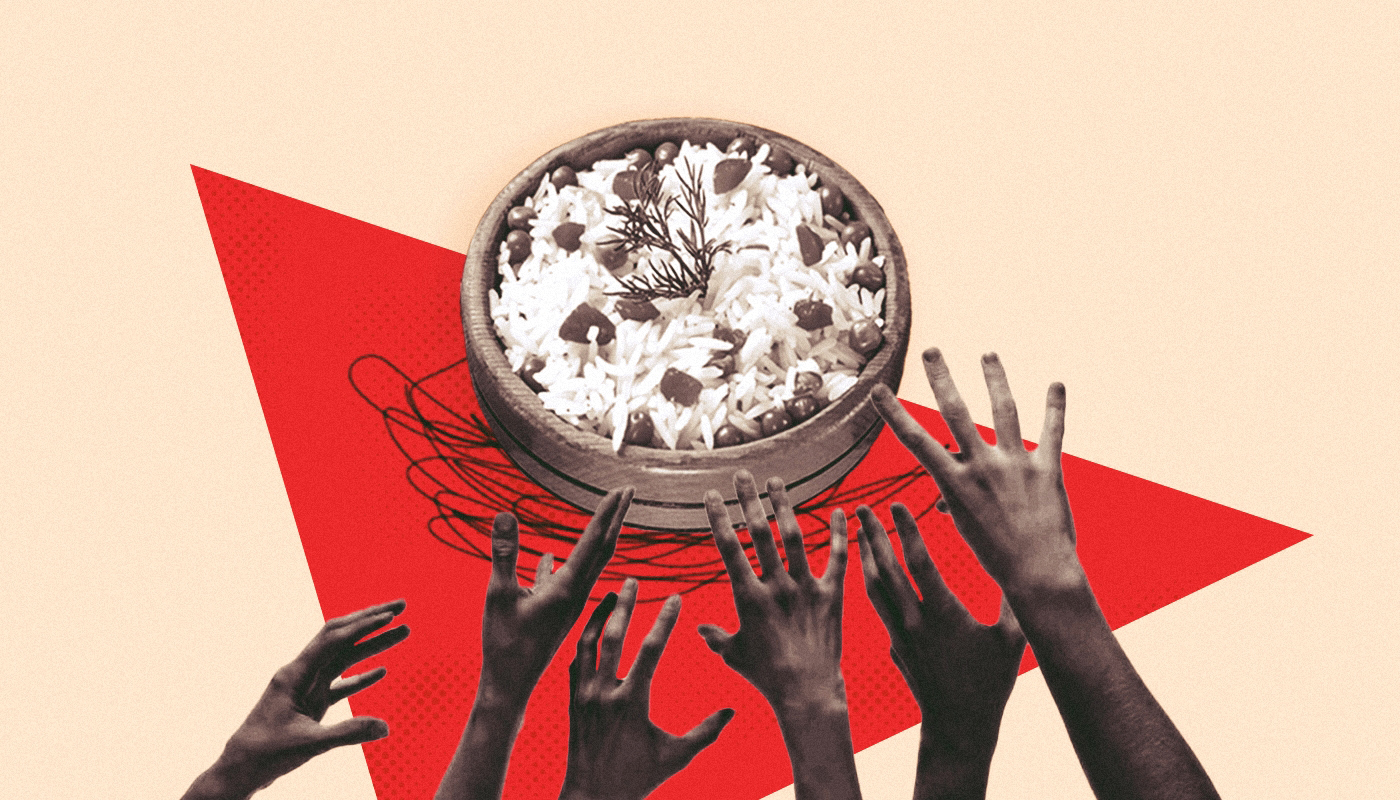Bangladesh’s food security depends on inclusion and innovation

Bangladesh's pursuit of a resilient and food-secure future is driven by its people—the farmers, women, youth, and local authorities who strive each day to nourish their families and strengthen their communities. As the nation confronts the intertwined challenges of climate change, limited economic opportunities, and development disparities, the way forward must be inclusive and rooted in national and local leadership.
The 2025 World Food Day theme, "Hand in Hand for Better Food and a Better Future," calls for renewed global solidarity and collaboration to build peaceful, sustainable, and food-secure societies that thrive in harmony with the planet. The theme highlights the importance of partnership across all sectors—a message particularly poignant in the context of Bangladesh, where agriculture is the backbone of the economy and a source of livelihood for millions.
For that to happen, governments, farmers, civil society, the private sector, and local and international partners must join forces to ensure that food is not only abundant but also safe, nutritious, accessible, and affordable, as well as produced and used sustainably.
Despite its relatively small land area, Bangladesh ranks among the world's top ten producers of 22 agricultural products. Over the past 20 years, the country has made impressive progress in transforming its food systems by updating its National Food Systems Pathway, modernising agricultural policies, and strengthening social protection. Yet, production and policy gains alone are not enough.
According to Food Security Statistics 2023 from the Bangladesh Bureau of Statistics, about 22 percent of Bangladeshi households face moderate to severe food insecurity, with one percent severely deprived. While progress has been made, the latest Integrated Food Security Phase Classification (IPC) analysis indicates that around 16 million people in Bangladesh are still facing acute food insecurity (IPC Phase 3 or above).
This challenge goes beyond food availability—it speaks to deeper issues of access, affordability, and vulnerability to economic and climatic shocks. These findings reaffirm the urgency of strengthening Bangladesh's agrifood systems through coordinated and multi-sectoral action.
The three United Nations food agencies—the Food and Agriculture Organization (FAO), the International Fund for Agricultural Development (IFAD), and the World Food Programme (WFP), collectively known as the Rome-Based Agencies (RBAs)—work in close partnership with the Bangladesh government to advance its national vision for food security and nutrition. Their joint efforts are grounded in the recognition that sustainable progress must be government-led and nationally owned, with international partners acting as catalysts for innovation, investment, and inclusive growth. RBAs's aim is to ensure engagement and empowerment of women, youth, and Indigenous communities to build an inclusive food system in Bangladesh.
Notably, women play a central role in food production and nutrition, yet they continue to face barriers to accessing land and formal financial services. A recent study of rural projects in Bangladesh found that for every dollar invested in women's empowerment, around four dollars in social and economic benefits were generated—indicating that gender equality efforts not only enhance individual and household well-being but also deliver significant economic returns.
In Cox's Bazar, the RBAs are supporting women by providing market linkages and livelihood opportunities. Women producers are connected directly with retailers through aggregation centres, enabling them to sell their produce at fair prices and even supply humanitarian food assistance to Rohingya refugees. Similarly, in Rangpur, the agencies are working with communities, especially women, to develop livelihoods through mushroom cultivation, livestock rearing, investments in climate-resilient housing, and insurance schemes. Through these community-led solutions, women are lifting themselves and their families out of poverty, inspiring others to follow in their footsteps.
Young people across Bangladesh are also shaping the future of food security and climate resilience. By expanding access to green skills, digital tools, and entrepreneurship training, we can equip the youth to lead in climate-smart farming, aquaculture, and food safety—ensuring that the next generation is empowered to drive innovation and sustainability in food systems.
Scaling evidence-based, integrated approaches for community resilience
Across Bangladesh, integrated approaches that link food assistance with livelihoods, education, and climate adaptation are already delivering results. Together with development partners, and national and local governments, they can strengthen climate hazard monitoring and early warning systems; expand anticipatory action and integrate it into national social protection systems; and rehabilitate embankments and other critical infrastructure before monsoons to protect vulnerable communities. These initiatives and collaborations can help communities better withstand shocks and economic stressors, while reducing their vulnerability before, during, and after disasters.
Another example of integration is home-grown, school-based programmes that combine local production and procurement, nutrition, literacy, and agricultural education—helping children stay in school, thrive, and become future farmers, entrepreneurs, and community leaders.
The collaborations between relevant stakeholders and agencies must combine technical expertise with financial support to boost rural economies. The goals should include leveraging new investments in climate-smart practices and innovation to increase agricultural productivity, producing more and better-quality food, enhancing farmers' resilience to climate shocks such as droughts and floods, building adaptive capacity, and reducing greenhouse gas emissions from agrifood systems—all while increasing carbon sequestration in soils and plants.
The transformation of Bangladesh's food system is not a distant aspiration; it is an urgent and shared priority. By scaling what works, including all voices around the table, investing in innovation, and strengthening national systems, we can build a food system that is inclusive, resilient, and sustainable.
Jiaoqun Shi is Food and Agriculture Organization (FAO) representative at United Nations.
Valantine Achancho is country director at International Fund for Agricultural Development (IFAD).
Dom Scalpelli is country director at World Food Programme (WFP), United Nations.
Views expressed in this article are the authors' own.
Follow The Daily Star Opinion on Facebook for the latest opinions, commentaries and analyses by experts and professionals. To contribute your article or letter to The Daily Star Opinion, see our guidelines for submission.



 For all latest news, follow The Daily Star's Google News channel.
For all latest news, follow The Daily Star's Google News channel. 

Comments